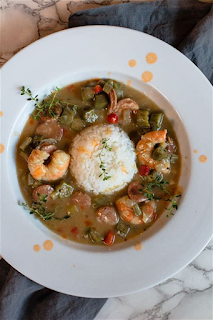Wilson picked out a
white plastic spoon from a paper cup stuffed with spoons and rolled napkins.
The corners of one napkin had someone’s barbeque fingerprints. Around him, the
crowded room groaned with the sounds of black and white people devouring whole
sides of beef and pork. Ordinary folks eating family style at Carmen Lee’s
Southern Café. With the gospel brunch over, the afternoon jazz lunch was in
full swing. Sitting at a single long community table, Wilson listened to
complete strangers share stories of their lives in between plates of Etouffee
and bowls of seafood gumbo, while Miles Davis’s muted trumpet added background
to the soulfulness of the food.
The
owner and chef, Carmen Lee, moved in and out of the room, greeting everyone
with the warmth of her smile, hugging the regulars, and kissing a few of the
older men. Carmen Lee’s legend went
beyond the comfort of her food. Married
three times, rumor had it her first husband died on their wedding night and the
second she shot for cheating on her with a bow-legged white waitress in a
chicken shack in Kansas City. Bernard, Carmen’s third husband was still new to
the cafe and Carmen’s ways. A lean, older man with white whiskers, Bernard
stayed close behind Carmen carrying bowls rice and plates of Carmen’s delicious
Creole creations. Bernard liked to joke that he was no saint, but neither was
Carmen Lee.
Carmen
stopped at the table behind Wilson and gave him a wet kiss to the cheek and
hug. Her blue cotton dress and stained
white apron smelled of sweat, garlic, and love. Wilson stood and gave her
another hug. She was an armful of woman.
“It’s
been too long, Sugar,” Carmen said.
“I
just got out of Angola.”
“Youse
do the crime, youse do the time,” Bernard said, ready with a platitude for any situation.
“Yes,
but a whole year without Carmen Lee’s cooking, that’s capital punishment.”
Wilson
and Carmen laughed together. They were old friends; at one time more than
friends. Carmen gave Wilson another hug and kiss, this time on the lips.
“Have
you met Bernard? We got married after you left.”
Bernard
set down a bowl of dirty rice, a plate of red beans, and a bottle of Tabasco
sauce on the table in front of Wilson and offered his hand. His grip was firm.
“You’re
a lucky man,” said Wilson.
“I knows
it,” Bernard said, looking at Carmen Lee.
Wilson
sat wondering what Carmen saw in the old hound dog. His understanding of women
was a black hole. The smell of the beef and livers in the rice brought him back
to reality. Wilson’s mouth watered. He wanted to dig into the rice and beans,
but he had come to Carmen Lee’s for two things. Now, only one was available,
the shrimp gumbo.
“How soon?” he asked Carmen, when
she passed by again, this time with a bowl of greens.
“Bernard’s adding the Gumbo File’
right now, Sugar,” she said, lightly touching the back of his neck. “You have
to be patient.”
Wilson knew that the ground
sassafras leaves made gumbo what it was. That and the okra. Not every New
Orleans or Creole cook included okra, but Carmen’s recipe called for fresh okra
added at the same time as the shrimp and sausage. At the last minute, Carmen
sprinkled slivers of roasted okra and a pinch of Gumbo Filé on top of each bowl
to thicken and brighten the Creole stew.
Wilson
was working on his second glass of brown ale when Mama delivered a black iron
skillet full of bubbling gumbo. Behind her, Bernard set down an empty soup bowl,
and a bowl filled with white rice. Customers could decide how much rice to mix
in with their gumbo.
“This
is on me, Sugar,” Carmen said, giving Wilson a soulful look as Dexter Gordon’s “Round
Midnight” came on the jukebox. “When you're done, maybe we can have a
dance.”
In
the skillet, the brown-green gumbo bubbled; thin wisps of steams emerged up
from the bottom of the skillet. Plump shrimp and pieces of sausage floated on
the top of the southern delight. Savoring the first spoonful, he realized the
waiting had been worth it. Fat Tuesday wouldn’t be complete without a bowl of Carmen
Lee’s Gumbo.
One time, Wilson asked Carmen what
made her gumbo so good?
“Patience, timing, and a little
love,” she answered. “The roux can take over an hour of constant stirring. You
have to wait for just the right moment when the color of the roux changes from
brick red to dark brown. Too soon and you have a tasteless soup, too long and
the stew will taste burned. When the roux is just right, and only then, can you
cook the carrots, celery, peppers, and onions followed by the fish stock, and
tomatoes. Gumbo is a labor of love,” she added.
Tasting
another spoonful, Wilson knew Carmen was right. Gumbo, like love, was all about patience and knowing when the moment is
right.












